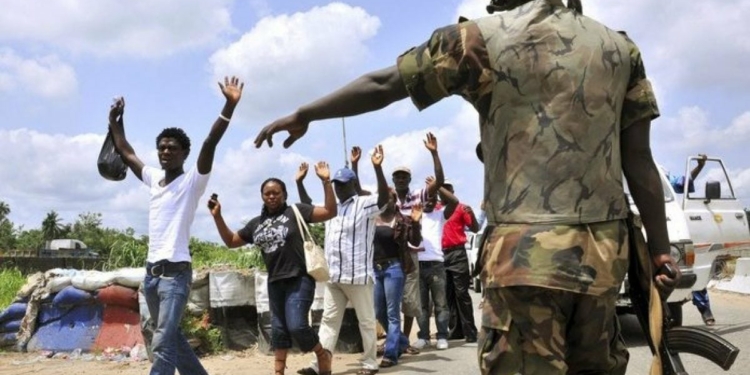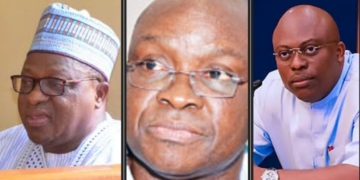- Recent occurrence of insecurity in South East Nigeria
- Formation of Security outfits to curb insecurity in S’East
- Alleged ‘I don’t care’ attitude of the Federal Government towards insecurity in South East
In the recent time, South East geopolitical zone of Nigeria comprising Abia, Anambra, Ebonyi, Enugu and Imo states have been literally overrun by criminal elements.
Every day, the media is awash with reported incident of killings, kidnappings and assassinations on both political and social figures in the zone.
There is no gainsaying the fact that violent crimes in south East like many other zones in the country are not a new phenomenon. It has been part and parcel of life even before the return of democracy in May 1999.
However, what has kept many citizens in palpable fear as the ugly trend unfolds is the lackadaisical and lackluster attitude of the authorities whose duty is to combat or flush out perpetrators of such criminal activities.
In the recent past, many political leaders in the zone did not close their eyes, fold their hands and watch wanton, senseless and brazen killings and kidnappings go on in the zone.
Formation of Bakasi Boys
In the early 20s, both Abia and Anambra states, for instance, following the seemingly uncontrollable rise of insecurity in these states, the then Executive governors of the state, instituted pseudo-security operatives to reduce such security situation to the barest level. The security outfit which came to be known as Bakassi Boys, to say the least, helped immensely in restoring the tranquility and security in the states.
The security outfit though received serious bashing and condemnation from so many rights groups, leading to its disbanding few months after the establishment, it helped immensely in flushing out criminal elements in these states.
Years after the disbanding of the Bakasi Boys, the security situation in these two states once again took a nose dive. Killings, kidnapping and other violent crimes became the order of the day.
Catalogue of reported violent crimes in the zone
On July 17, 2012, Peter Obi, then Governor of Anambra State, swore in five new commissioners. One of them was Chike Okoli. He was assigned to the Ministry of Science and Technology where he would serve as commissioner until the expiration of Mr. Obi’s governorship tenure in March 2014.
However, two months later, around May 21, 2014, Chike set out from the state capital in Awka to Nanka, his village in Orumba South Local Government Area (LGA) of the state. He never got there. He never knew he was embarking on a journey of no return.
Somewhere in Agulu, not far from Nanka, Chike’s car was reportedly intercepted by men in a Sports Utility Vehicle (SUV), who abducted him.
Despite having much of their ransom demand of N16 million met, Chike has not been seen or heard from since then. It was widely reported at the time that Chike was “abducted by unknown gunmen.”
Three years before this ugly incident, in the first six months of 2009, it was reported that violent crime has killed over 60 people in Anambra State alone.
Abia, Anambra and Imo States in the South-east were among the top five in the kidnapping league table compiled by Nigeria’s security agencies in 2009. A report by the Voice of America in December 2009 attributed these trends in the South-East to “criminality and violence from the proliferation of armed gangs.”
One year later, in the last quarter of 2010, Aba, the commercial centre in Abia State, was reported to be “in the firm grip of kidnap militia.”

The highly investigated security report that was meant to awaken the consciousness of a people and have a knock on effect on proffering lasting solution was swept under the carpet, hence the escalation of security in the state in particular and the zone in general.
It is quite erroneous, however, to assume that the soaring breakdown of security in the zone is being caused solely by non state actors.
When unknown assassins set upon the then Chairman of the Nigerian Bar Association (NBA) in Onitsha, Barnabas Igwe and his wife, Abigail, brutally killing both around September 1, 2002, IPOB was not in existence.
Three years later, the former Governor of Anambra State, the recently deceased Chinwoke Mbadinuju, walked free on charges of having procured the double murder of Mr. and Mrs. Igwe. Their killers remain unknown.
Of course, non state actors can not be entirely exonerated from violence in the South East zone more so when they can no longer control the surging spate of threats been issued by their members.
At the same time, the violence in the zone is not exclusive to non-state actors or gangs. The month before the Ozubulu Massacre, scores of bodies of dead young men were found floating on the Ezu River in Anambra State in a mass liquidation that appeared to bear the trademark of the Special Armed Robbery Squad (SARS).
Again, it was reported in the early hours of February 7, 2001, over 150 armed men of the Police Mobile Force attacked what was believed to be the national headquarters of the Movement for the Actualisation of the Sovereign State of Biafra (MASSOB), in Okigwe, Imo State, shooting at will at hundreds of unarmed activists. It was reported that dead “casualties of the raid littered everywhere.” In May 2008, MASSOB released a list of 2,020 of its members allegedly killed by Nigerian security agencies.

Proliferation of small arms has become a thorny issue that our legislators have yet to give a lasting solution that it deserves. Some political analysts have argued that the reason for such attitude is not farfetched.
Every election year, tens of hundreds of youths in the zone are being recruited into armed gangs by political bigots who see election as a do or die affair.
In 2007, for instance, during the gubernatorial election in Enugu state, hundreds of youths in the state were heavily armed to literally liquidate any persons that would constitute a stumbling block to the ruling party in the state.
It was reported that many youths lost their lives to political violence that ensued between the ruling and the opposition parties which wanted to take over power.
What many well meaning citizens of the zone have continued to ask is what happens to such sophisticated weapons after the elections.
What they will not tell you is that they end up being used as a weapon of terrorism and banditry more so when the procurers of these weapons ended up as losers in the said elections.
Establishment of Ebubeagu security outfit
After the 2019 general elections, the security situation in the zone continued to worsen. Killings, kidnappings and banditry took a meteoritic rise in a proportion that has not been witnessed even during the Nigeria/Biafra war.
All the security apparatus in the zone seemed to have been overwhelmed so much so that even the security operatives became targets of attack of the so called “unknown gun men.”
Police stations and government establishments were daily touched by these gun men.
As the zone watch helplessly while these hoodlums overrun the five states with ease, governors of these states convened emergency security meeting in Enugu in April 2021.
Their sole aim was to establish a strong security outfit, something of a resemblance of Amotekun in the South West zone to combat and possibly flush out criminal elements in the zone.
David Umahi, the then governor of Ebonyi state and chairman of the South East governors forum in his speech during the establishment of the security outfit states that the zone needed to galvanize strong security outfit.
“After exhaustive discussions on the current security challenges in the South East and with valuable contributions from participants at the first South-East security summit in Owerri on this day Sunday, April 11th 2021, it was resolved as follows:
“To strongly and unequivocally condemn terrorism and banditry in any part of Nigeria, particularly in the South East. The meeting strongly condemns the burning of police stations, violent attacks on custodial centres with the unlawful release of inmates, and the killings including security personnel, natives/ farmers and herdsmen.
“That the five South-East states are on the same page with the federal government on the issue of security challenges in the country. To this end, the meeting makes it absolutely clear that the Southeast will stand resolutely with the federal government to fight terrorists and bandits to a finish
“That the political leadership in the South-East has resolved to bring together all the arsenals at their command, as one united zone, to fight and flush out criminals and terrorist from the zone.
“That the summit resolved that to achieve this, there is a need to galvanise all the relevant stakeholders in the south-east, the political class, the business community, the bureaucrats and the intelligentsia to provide all necessary support to security operatives in the five south-east states to ensure total success in the fight against criminality in the zone.
“That the heads of all the security agencies in the southeast have resolved to exchange intelligence in a seamless, effective new order that will help to checkmate crime in the zone.
“That to fast track crime-busting in the southeast, the heads of security agencies have been mandated to draw up a comprehensive list of their logistics and material needs for sustainable success in the fight against criminality, for the immediate provision by the leadership of the South East.
“That a committee made up of security personnel, government officials and relevant stakeholders are set up to coordinate and monitor the implementation of the southeast joint security platform.
“To applaud the initiative of the Southeast security summit and to make it a statutory summit that will convene every quarter while its hosting shall rotate among the five southeast states.
“The meeting resolved to maintain a joint security vigilante for the South East otherwise known as Ebube Agu.
“The meeting appreciated the formation of a South-East joint security outfit, named Ebubeagu. Headquarters in Enugu, to coordinate our vigilante in the South East.”
Ebubeagu like every other security outfit was a product of rash and impulsive security demand. Like its predecessor, Bakasi Boys, it was created to flush out and solve immediate security problems.
And for this and every other reason, there was no legislative backing to the Ebubeagu security outfit.
It has been argued that the regional security outfit in the South East should be institutionalized by the statutory establishment. Its Command and control structure should integrate active citizen involvement.
Indeed, while Ebubeagu faces several allegations of rights abuses, torture and killings, there are also purported reprisals against them. In Ebonyi state, in January 2022, a member of the Ebubeagu outfit was shot and then beheaded.
On March 31st, an operative of the outfit was killed in the Nduogbuovu community of Izzi LGA Ebonyi State. Similarly, a commander of the Ebubeagu outfit was killed in the mid of March 2022 in Ezza North LGA. In Imo State, controversy trailed a video that circulated widely on social media, which showed the assassination of a man initially identified as the commander of Ebubeagu in Imo State. IPOB and other sources have declared that the person killed in the video was not the commander of the Ebubeagu security group in Imo State.
These governors failed to give Ebubeagu the legal backing it needed to fully function as a complimentary security outfit of Police.
In fact, in Ebonyi and Imo states, security situation took a serious nose dive after the establishment of Ebubeagu as they were accused of being used by their governors to hunt down their political enemies.
In Ebonyi state, for instance, the security outfit became so much uncontrollable that they allegedly killed, maimed and extorted at will and without any remorse.
However on February 14, 2023, following all these allegations of atrocities against Ebubeagu security outfit, Justice Riman Fatun of Federal High Court Abakaliki division declared “Ebubeagu” in Ebonyi illegal and consequently ordered the Department of State Services, DSS, to collect all the weapons in possession of operatives of the security outfit.
The court delivered the judgment in a suit filed by Mr Abia Onyike, Director of Media and Publicity, Ebonyi PDP Campaign Council, for the then forthcoming general elections.
Justice Fatun ordered the disbandment of Ebubeagu security initiative due to the human rights abuses, extortions, illegal arrests and use of firearms perpetuated by the body.
“I hereby declare the Ebubeagu outfit illegal and therefore, it ceases to exist as Ebonyi State House of Assembly has no powers to approve their existence,” he stated.
The Court also ordered Ebonyi Government to pay Onyike the sum of N50 million as damages over his abduction and torture by the Ebubeagu Security Outfit in Abakaliki in Nov. 2022
Ebubeagu had on Nov. 11, 2022, arrested and detained Onyike.
Mr Micheal Odo, Counsel to Onyike, told journalists that he approached the Court to seek for a determination on, “Whether the Ebonyi State House of Assembly has the constitutional powers to enact such Security Agency.
“I also approached the court to seek whether the arrest of the plaintiff on 9/11/2022 and detention and torture by operatives of the Ebubeagu Security Agency and/or Ebonyi State Ebubeagu Corps at the Old Government House , Abakaliki, Ebonyi State, are lawful.
“I am happy over the judgement and today, justice has been done to my client,” Odo added.
The Ebonyi state government watched helplessly as the state security outfit that was meant to reduce high rate of criminalities run hay wire and consequently crumble under his feet, or rather succumb to tidal wave of legal arsenal been thrown at it.
Disbanded, they were but what was unclear remained what actually happened to their arms and ammunition.
Attitude of the federal government
It has been alleged in some quarters that the Buhari regime approached insecurity in South-East Nigeria with peculiar prejudices; which did not much bother itself with knowledge or evidence.
With the region excluded from strategic leadership of the security services, much of the decision making about how to manage exposure to insecurity in that part of the country lacked the benefit of informed insights.
Far from being helpful, the interventions by the Buhari did much to hinder efforts to find solutions to insecurity in the region. To be fair, the South-East was not the only region mismanaged under the Buhari mis-adventure, at least security wise.
For instance, the decision by National Security Adviser in his inaugural Annual Security Threat Assessment in 2017 to take a federal character approach to security threat analyses and narrows down a resilient problem of insecurity in the South-East into an IPOB problem, putting the group on the same footing as Boko Haram is a disaster that could have been averted.
Renewed hope of better security in the zone
As the country turns the page on a toxic eight years, there is an opportunity to re-think the metrics and methods by which it manages insecurity, especially in the south East zone.
Recently, President Bola Ahmed Tinubu appointed an Enugu-born Emmanuel Ogalla as the Chief of Naval Staff.
This is a big milestone in tackling security situation in the zone as the new Naval Chief stands a good chance of proffering a lasting solution to the insecurity in the zone with a view to changing the narratives.





Discussion about this post